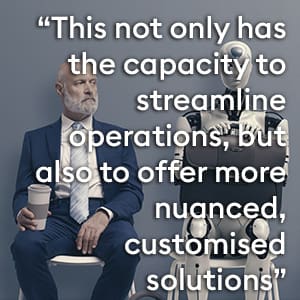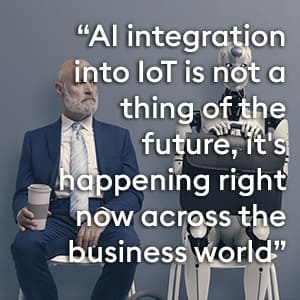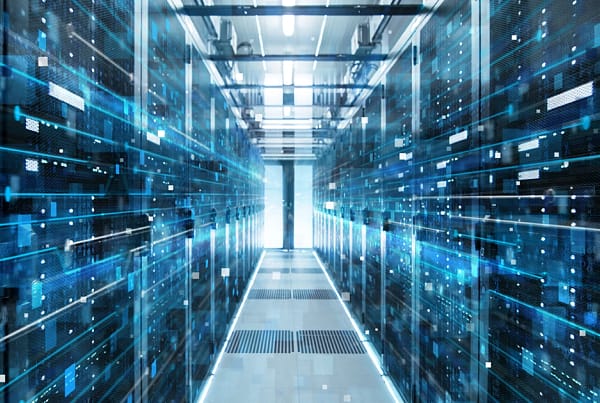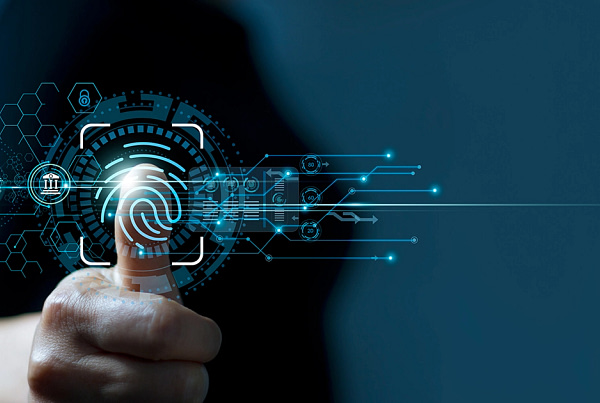How Artificial Intelligence is Creating Smarter Next Gen IoT Technology for Business
Artificial Intelligence (AI) is finding its way into every facet of our lives, transforming how we work and interact, and even the way we make decisions. It is therefore unsurprising that clever innovators have decided that one of the best ways for AI to help us all at work is to integrate it into the Internet of Things (IoT), marking a leap forward in how businesses leverage IoT technology to drive significant efficiency, automation and security benefits.
This article looks at the power of AI integration within IoT ecosystems, where it is already in use, and how it could be useful for your business.
IoT Solutions – perfectly primed for AI integration

The process goes something like this: IoT devices collect data and transfer it to a centralised processing centre; AI algorithms analyse that data to identify patterns and anomalies, producing recommendations which can be fed to human operators, or which generate autonomous decision making and responses. The data, decisions and responses are stored to be learned from so processes can continue to be optimised.
Businesses keen on staying at the forefront of technological innovation should keep an eye on this evolving landscape, where AI’s analytical power meets IoT’s data-rich potential.
Benefits of Integrating AI into IoT
Here are seven key benefits of AI integration into IoT ecosystems.
- Enhanced Data Analysis: AI can process and analyse the vast amounts of data generated by IoT devices, providing deeper insights faster, more accurately and more efficiently than ever before.
- Predictive Maintenance: By predicting failures before they occur, AI integration helps reduce downtime and maintenance costs.
- Personalised User Experiences: AI can tailor services and products to individual preferences by learning from user interactions and adapting accordingly.
- Improved Security: AI algorithms can detect anomalies that may indicate threats, enhancing IoT security across devices and networks.
- Operational Efficiency: AI can be used to automate routine tasks and optimise operations for better resource utilisation and cost savings.
- Real-time Decision Making: By analysing data and learning from experience AI can improve system responsiveness to changing conditions or requirements.
- Innovative Product Development: Facilitates the creation of smarter AI-powered IoT products, offering businesses a competitive edge.
AI’s Role in Improving IoT Security

By employing sophisticated algorithms to constantly learn from the data IoT devices generate, AI can predict and neutralise threats before they become critical. This predictive capability is crucial for pre-empting attacks that traditional, reactive security measures might miss. Furthermore, AI-driven IoT security systems can adapt over time, learning from incidents to enhance their detection capabilities, ensuring a dynamic and robust shield against evolving cyber threats. This integration not only streamlines IoT security operations but also introduces a level of proactivity, intelligence and responsiveness that was previously unattainable, marking a new era in safeguarding for the IoT ecosystem.
The Argument Against AI Integration into IoT
While the advance of AI integration into everything seems like an unstoppable force, there are arguments against integrating AI into IoT systems. These arguments primarily focus on concerns related to security, privacy, and complexity/cost.
While aspects of AI’s capability can improve IoT security (in threat detection and response), it can also introduce new vulnerabilities which increase the potential for data breaches as sophisticated cyber-attacks can exploit weaknesses in AI algorithms to manipulate or ‘poison’ data – either giving attackers access to the network or forcing the AI to make incorrect decisions. Privacy concerns arise from AI’s ability to analyse the vast amounts of personal data collected by IoT devices. Additionally, integrating AI with IoT can complicate system design, operation, and maintenance, increasing costs, as often specialised assistance and support is needed.
These challenges underscore the need for careful consideration and robust security measures in AI-enhanced IoT deployments.
Rise of the Machines: Nokia’s Smart Factory

One example is Nokia’s 5G factory in Oulu, Finland which is pushing boundaries by utilising Omron LD Autonomous Intelligent Vehicles (AIVs) to deliver materials from storage to the production line without any human interaction. Smart buffers send automated requests for materials to these autonomous robots which are able to navigate the significant distance from pick-up to drop-off, acting collaboratively to ensure that the production process always has the resources it needs to maximise efficiency. Thanks to this AI-powered industrial IoT system Nokia has reported a 30% increase in productivity from this factory.
The Future of AI in IoT
The integration of AI into IoT ecosystems is forging a future where technology is not just connected but intelligent, deeply transforming how many business processes are performed. AI’s role in personalising user experiences and streamlining operations, from healthcare to manufacturing, heralds a new era in our interaction with technology. As AI learns and adapts to user behaviours, operations and vulnerabilities, it will bring about more intuitive, efficient and secure environments through our IoT solutions.
For more information on IoT Technology contact Assembly Managed Services.
Telephone: +44 (0)20 3795 6880
Have you enjoyed this blog? If so, why not share it on your preferred social media platform?






